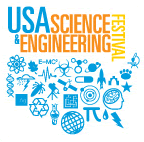Last updated: May 06, 2014
Dna Day Inspiring The Future Generation Of Scientists
DNA Day: Inspiring the Future Generation of Scientists
April 3, 2014
Engaging students at a young age offers our best chance to inspire them about scientific concepts and the process of scientific inquiry. For that reason, NHGRI has an active and robust outreach and education program. On April 25th, we will celebrate the 12th Annual National DNA Day, which commemorates the completion of the Human Genome Project in 2003 and the discovery of DNA's double-helical structure in 1953. NHGRI celebrates DNA Day every year with a number of events. Below, I highlight some of our DNA Day programs, as well as our other student- and teacher-focused activities that bring genomics into the classroom.
DNA Day offers students, teachers, and the public many exciting opportunities to learn about the latest advances in genomics research and to explore how genomics may be meaningful for their lives. More information about DNA Day activities can be found at genome.gov/10506367/national-dna-day/ or on the DNA Day Facebook page at facebook.com/DNAday.
For example, the DNA Day Ambassador Program (genome.gov/20519691) sends NHGRI researchers and trainees out to middle schools, high schools, and colleges to talk about their work, their career paths, and exciting developments in genetics and genomics research. This program is beneficial for the students and teachers, and also gives NHGRI staff members an opportunity to be involved in science education - a challenging but rewarding endeavor!
This year, the DNA Day Ambassadors will have a strong presence at the USA Science and Engineering Festival (USEF) taking place at the Walter E. Washington Convention Center in Washington, D.C. on April 25-27. The USEF is a national grassroots effort to advance Science Technology Engineering Mathematics (STEM) education and inspire the next generation of scientists and engineers. NIH and NHGRI will be among the 650 exhibitors interacting with students, teachers, and the public - in fact, the NIH will have a very large 'footprint' at the festival, with 19 booths for activities that convey the 'coolness' of our science. At the last USEF in 2012, more than 250,000 individuals participated in the three-day event.
 DNA Day will coincide with USEF's Sneak Peak Friday, a day during which visitors can preview the exhibits before they open to the general public on Saturday and Sunday. School groups, homeschoolers, and military families will be coming in large numbers to the festival that day. On all three days of the USEF, our DNA Day Ambassadors will lead attendees through DNA-inspired hands-on activities. To learn more about the upcoming festival, visit usasciencefestival.org/.
DNA Day will coincide with USEF's Sneak Peak Friday, a day during which visitors can preview the exhibits before they open to the general public on Saturday and Sunday. School groups, homeschoolers, and military families will be coming in large numbers to the festival that day. On all three days of the USEF, our DNA Day Ambassadors will lead attendees through DNA-inspired hands-on activities. To learn more about the upcoming festival, visit usasciencefestival.org/.
In past years, the DNA Day Chatroom has offered an opportunity for students from all over the world to ask NHGRI experts questions about basic and clinical research, careers in genomics, and the ethical, legal, and social implications of genomics research. The chatroom was live from 2005-2012, and in that time, NHGRI researchers and staff answered more than 5,000 questions from thousands of students at hundreds of schools around the world. To view transcripts for each of the past DNA Day Chatrooms, visit genome.gov/27026087. This year, all of our volunteer experts will be at the USEF, so we will not be hosting the chatroom.
Additionally, a variety of online tools are available on the NHGRI web site (genome.gov/20519692/get-activity-ideas/) for teachers to use in developing their genetics and genomics curriculum on DNA Day and throughout the year. Two of my favorites are the Talking Glossary of Genetic Terms and the Genomic Careers website.
The Talking Glossary of Genetic Terms, available in both English (genome.gov/Glossary/) and Spanish (genome.gov/GlossaryS/), helps students, teachers, and the public understand the terms and concepts used in genetics and genomics research. In addition to definitions, experts share their descriptions of terms, and images, 3-D animation, and relevant links are provided for many terms. To engage young learners, the glossary is also available as an iPhone and iPad App.
The Genomic Careers website (genome.gov/genomicCareers/) is designed to help students discover the many vocational opportunities in the dynamic fields of genomics and genetics. The site incorporates interactive video and guided tours to explore dozens of career possibilities and to hear from professionals about their careers and their experiences.
The NHGRI Education and Community Involvement Branch (ECIB), part of the Institute's Division of Policy, Communications, and Education, is the catalyst for these student-focused education programs. Working with outside organizations, ECIB reaches students and teachers from across the United States and around the world. To learn more about the full complement of ECIB programs and activities, visit genome.gov/Education/.
Posted: May 6, 2014
